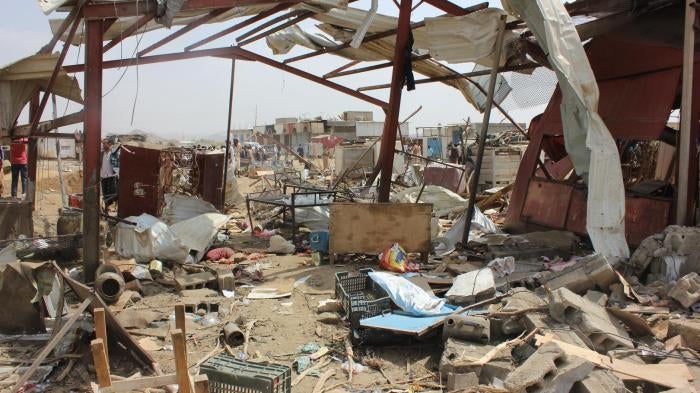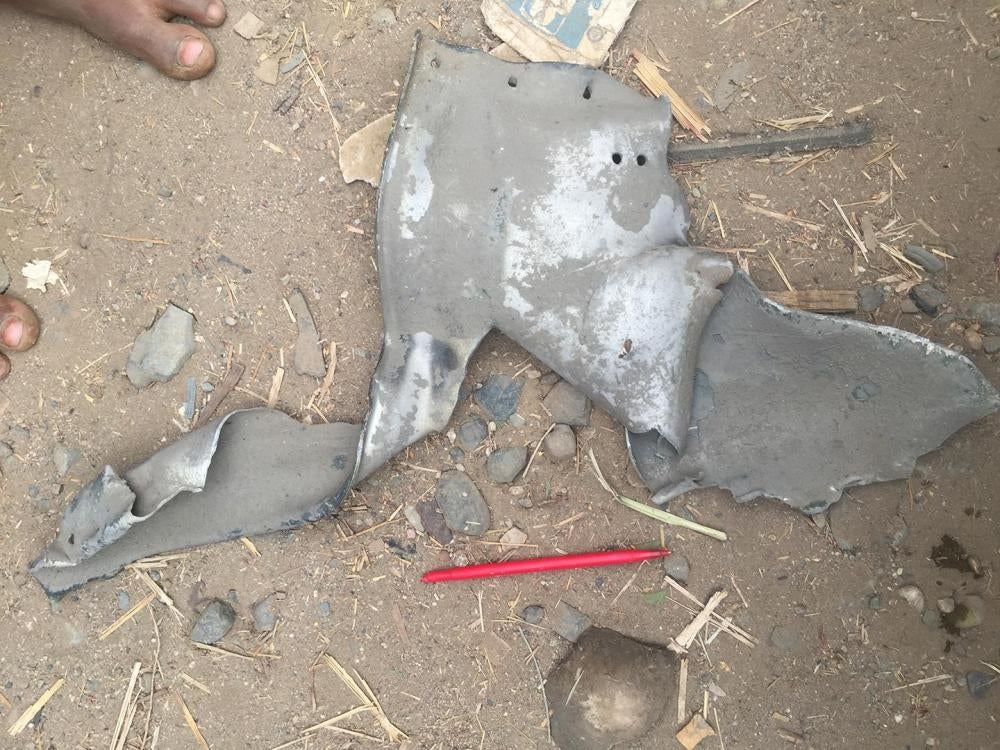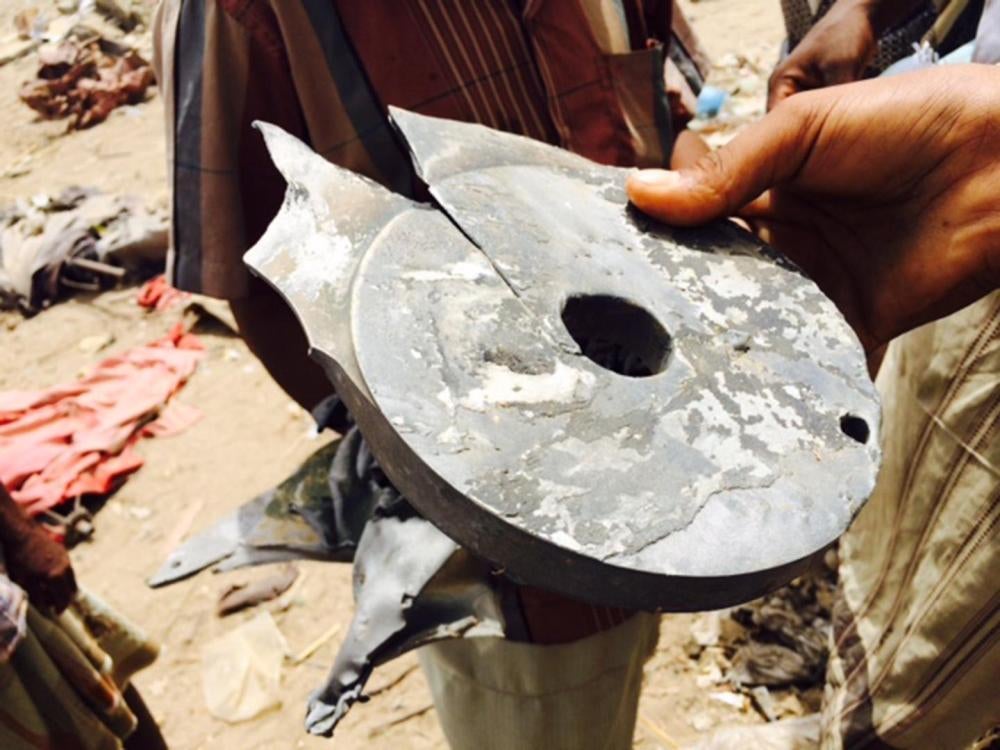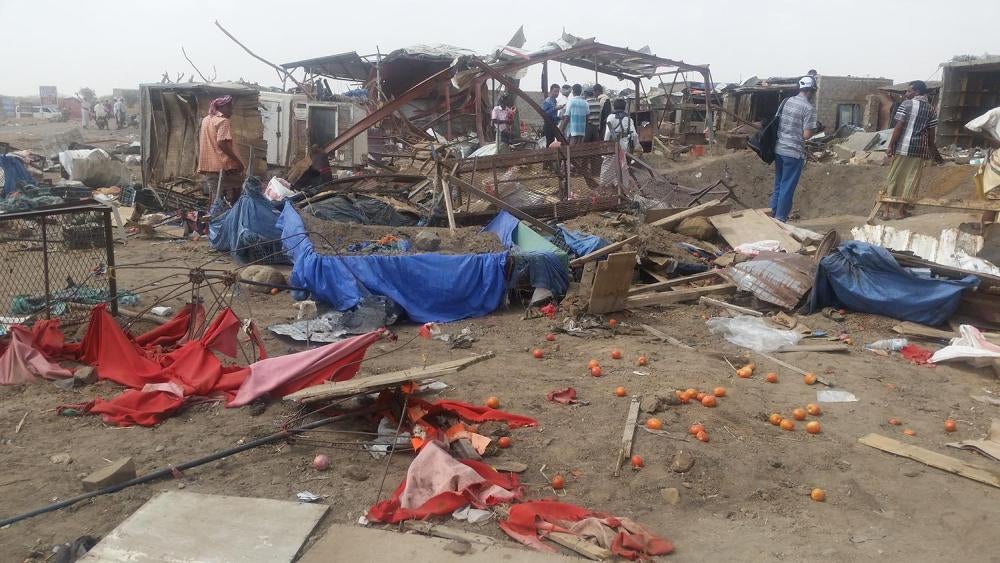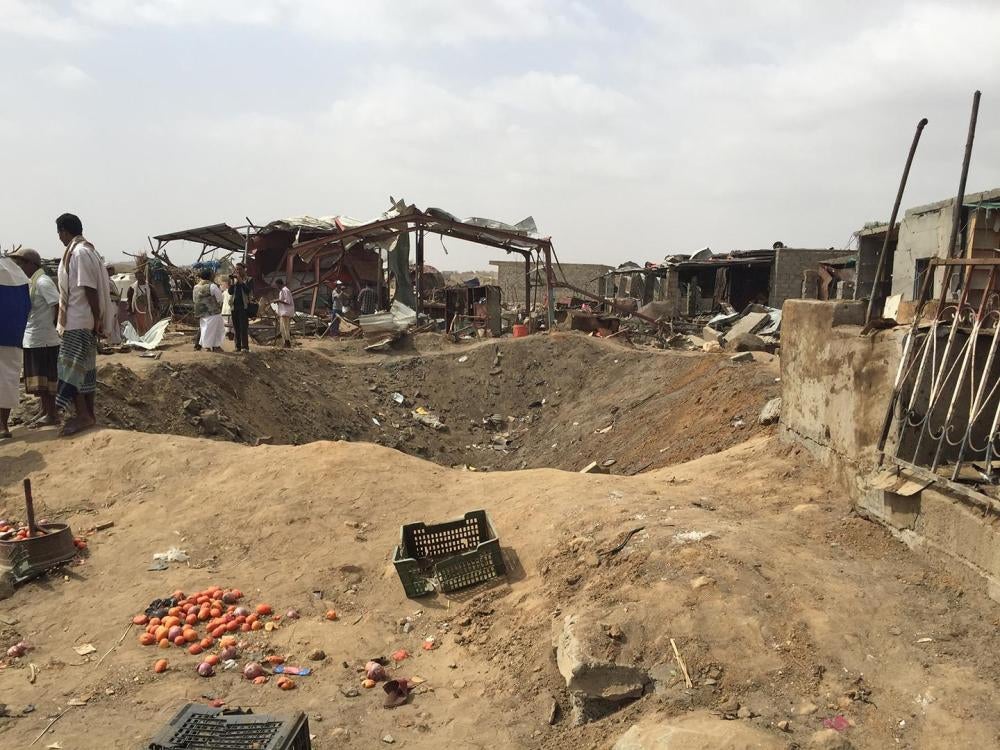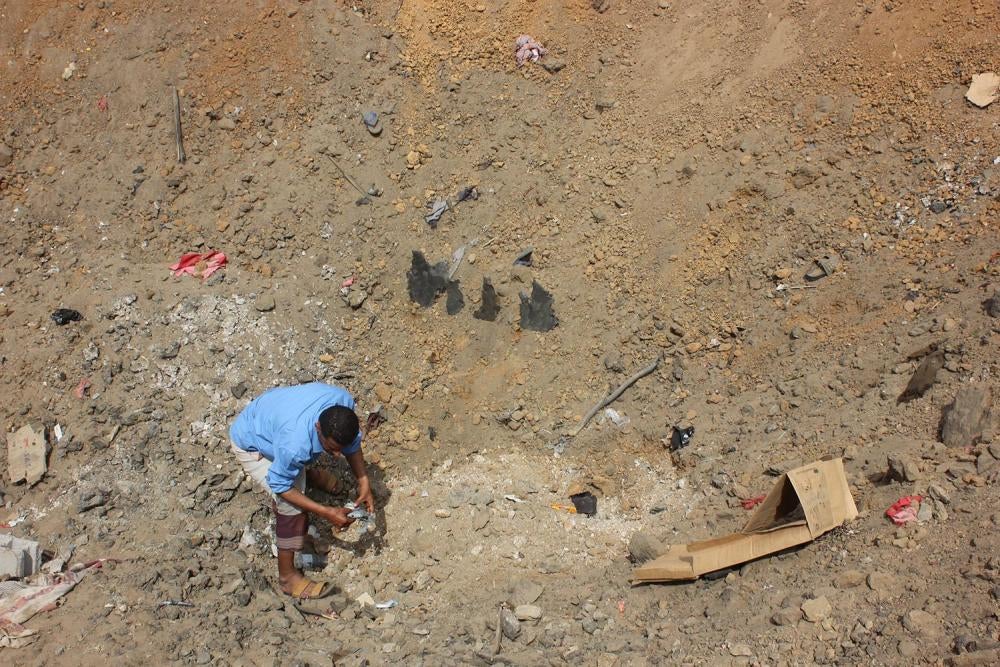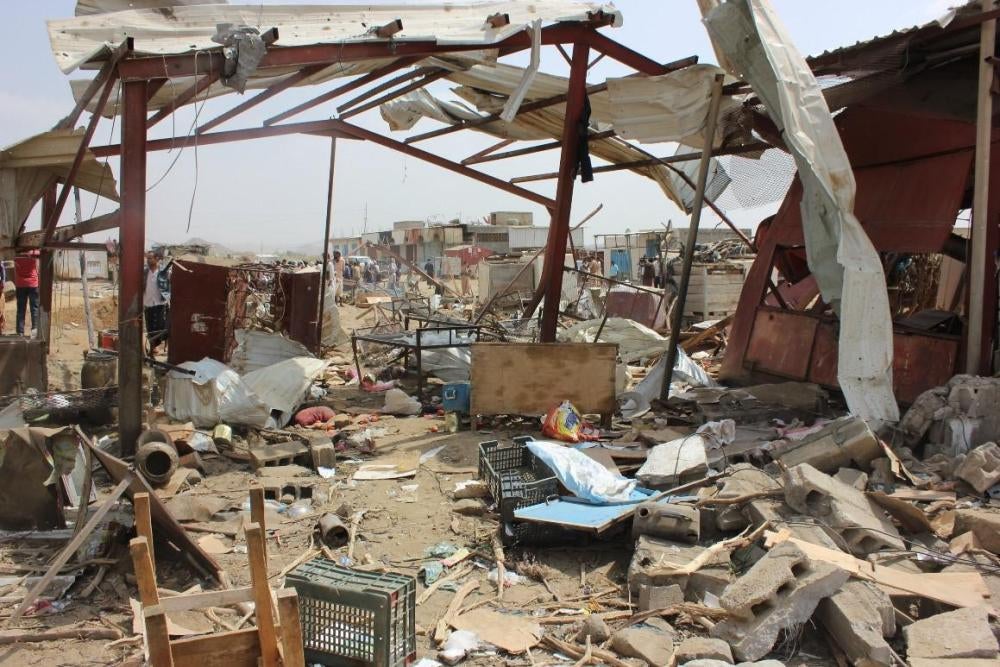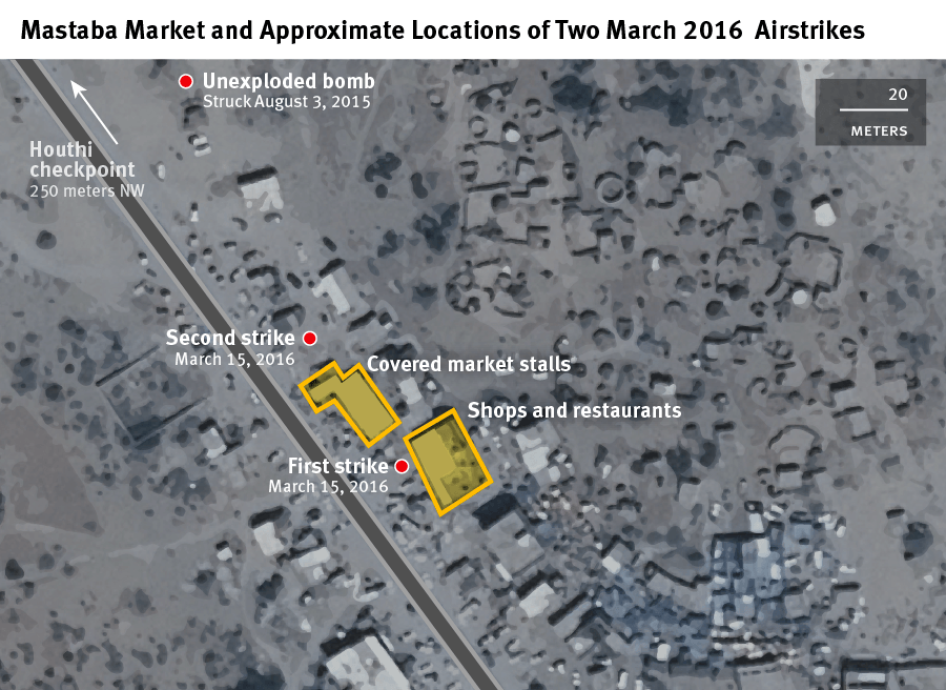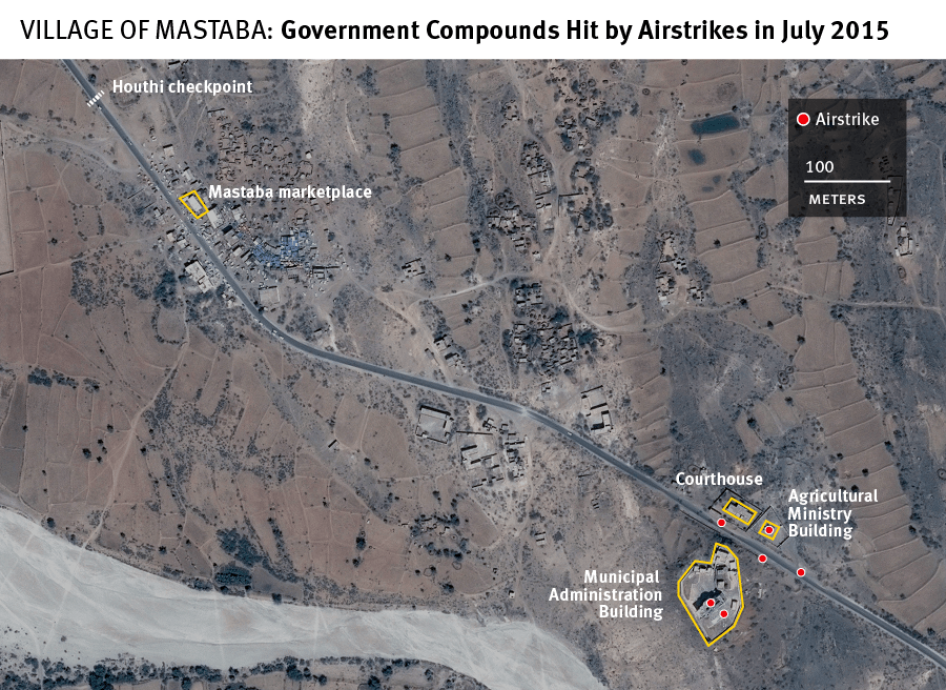(Sanaa) – Saudi Arabia-led coalition airstrikes using United States-supplied bombs killed at least 97 civilians, including 25 children, in northwestern Yemen on March 15, 2016, Human Rights Watch said today. The two strikes, on a crowded market in the village of Mastaba that may have also killed about 10 Houthi fighters, caused indiscriminate or foreseeably disproportionate loss of civilian life, in violation of the laws of war. Such unlawful attacks when carried out deliberately or recklessly are war crimes.
Human Rights Watch conducted on-site investigations on March 28, and found remnants at the market of a GBU-31 satellite-guided bomb, which consists of a US-supplied MK-84 2,000-pound bomb mated with a JDAM satellite guidance kit, also US-supplied. A team of journalists from ITV, a British news channel, visited the site on March 26, and found remnants of an MK-84 bomb paired with a Paveway laser guidance kit. Human Rights Watch reviewed the journalists’ photographs and footage of these fragments.
“One of the deadliest strikes against civilians in Yemen’s year-long war involved US-supplied weapons, illustrating tragically why countries should stop selling arms to Saudi Arabia,” said Priyanka Motaparthy, emergencies researcher at Human Rights Watch. “The US and other coalition allies should send a clear message to Saudi Arabia that they want no part in unlawful killings of civilians.”
Human Rights Watch has called on the United States, United Kingdom, France, and other countries to suspend all weapon sales to Saudi Arabia until it curtails its unlawful airstrikes in Yemen, credibly investigates alleged violations, and holds those responsible to account. Selling weapons to Saudi Arabia may make these countries complicit in violations, Human Rights Watch said.
On March 15 at about noon, two aerial bombs hit the market in Mastaba, in the northern Hajja governorate, approximately 45 kilometers from the Saudi border. The first bomb landed directly in front of a complex of shops and a restaurant. The second struck beside a covered area near the entrance to the market, killing and wounding people escaping, as well as others trying to help the wounded. Human Rights Watch interviewed 23 witnesses to the airstrikes, as well as medical workers at two area hospitals that received the wounded.
A United Nations human rights team visited the site the day after the attack and compiled the names of 97 civilians killed in the strike, including 25 children. The UN team said that another 10 bodies were burned beyond recognition, bringing the total number of victims to 107. Two Mastaba residents said that many members of their extended families had died. One lost 16 family members, and the other 17. A local clinic supported by Doctors Without Borders (MSF) received 45 wounded civilians from the market, three of whom died and were counted in the total death toll.
A witness who helped retrieve bodies said that he saw the bodies of about 10 Houthi fighters, whom he knew previously, among those killed. He said that some armed Houthi fighters regularly ate and slept in a restaurant about 60 meters from where one bomb detonated. The restaurant was not damaged. He said some residents objected to the Houthis’ presence but were powerless to remove them. Human Rights Watch was not able to confirm these claims with other witnesses. The only Houthi military presence identified by Human Rights Watch during its visit was a checkpoint manned by two or three fighters about 250 meters north of the market.
On March 16, the day after the attack, the Saudi military spokesman for the coalition, Gen. Ahmad al-Assiri, said that the strike targeted “a militia gathering.” He also noted that the area was a place for buying and selling qat, a plant widely chewed in Yemen as a mild stimulant, indicating that the coalition knew the strike hit a civilian commercial area. On March 18, al-Assiri told Reuters that the coalition used information from Yemeni military forces loyal to President Abdu Rabbu Mansour Hadi when targeting the Mastaba site. He said the Houthis “deceived people by saying it was a market.” A graphic forwarded to Reuters prepared by Hadi’s government indicated that the target was a military area where Houthi forces had gathered but provided no further detail.
The laws of war prohibit deliberate attacks on civilians and indiscriminate attacks, which are attacks that strike military objectives and civilians or civilian objects without distinction. Attacks that are not directed at a specific military objective are considered indiscriminate. An attack is disproportionate if the anticipated loss of civilian life and property is greater than the expected military gain from the attack. The Houthis’ use of a building in the market as a barracks would have amounted to failure to take all feasible precautions to protect civilians under their control from the effects of attacks. However, this in itself would not have justified the coalition airstrikes as carried out.
Individuals who commit serious violations of the laws of war with criminal intent may be prosecuted for war crimes. Individuals may also be held criminally liable for assisting in, facilitating, aiding, or abetting a war crime. All governments that are parties to an armed conflict are obligated to investigate alleged war crimes by members of their armed forces.
Hadi’s government announced on March 18 that it had formed a committee to look into the bombing. Human Rights Watch contacted the Yemeni human rights minister, who said that a Yemeni national investigative body created in September 2015 and based in Aden was charged with the investigation. Findings have not yet been reported.
Since March 26, 2015, a coalition of nine Arab countries has conducted military operations against the Houthi armed group and carried out numerous indiscriminate and disproportionate airstrikes. The airstrikes have continued since the announcement of a ceasefire, to begin on April 10. The coalition, whose targeting decisions are made in the Saudi Defense Ministry in Riyadh, has consistently failed to investigate alleged unlawful attacks or to hold anyone accountable.
On February 25, 2016, the European parliament passed a resolution calling on the European Union’s high representative for foreign affairs and security policy, Federica Mogherini, “to launch an initiative aimed at imposing an EU arms embargo against Saudi Arabia.” On March 15, the Dutch parliament voted to impose the embargo and ban all arms exports to Saudi Arabia.
Human Rights Watch and other international and Yemeni groups have called for foreign governments to halt sales and transfers of all weapons and military-related equipment to parties to the conflict in Yemen if “there is a substantial risk of these arms being used…to commit or facilitate serious violations of international humanitarian law or international human rights law.”
The US military has deployed dedicated personnel to the Saudi joint planning and operations cell to help “coordinate activities.” US participation in specific military operations, such as providing advice on targeting decisions and aerial refueling during bombing raids, may make US forces jointly responsible for laws-of-war violations by coalition forces. As a party to the conflict, the US is obligated to investigate allegedly unlawful attacks in which it took part.
“Even after dozens of airstrikes on markets, schools, hospitals, and residential neighborhoods have killed hundreds of Yemeni civilians, the coalition refuses to provide redress or change its practices,” Motaparthy said. “The US and others should pull the plug on arms to the Saudis or further share responsibility for civilian lives lost.”
Market Airstrike
At about noon on March 15, 2016, an airstrike hit the crowded market in Mastaba, in northern Yemen. It detonated in front of a line of shops selling groceries and household items, and a restaurant on the floor above the shops. Ali Ahmad Nahan, a secretary working at his home nearby, said he heard the sound of planes and ran outside. He saw two planes circling the market area, then saw an explosion. Approximately five minutes later, he said, he saw a second explosion.
When the first strike came, the world was full of blood. People were all in pieces, their limbs were everywhere. People went flying. Most of the people, we collected in pieces, we had to put them in plastic bags. A leg, an arm, a head. There wasn’t more than five minutes between the first and second strike. The second strike was there, at the entrance to the market. People were taking the injured out, and it hit the wounded and killed them. A plane was circling overhead.
I was helping to remove the dead, trying to pick a man up to see who he was. Then the second strike hit. Shrapnel hit me in the face. After the second strike, I just ran away. The shrapnel cut my lip and inside my mouth, I lost these teeth.
Sixteen members of the extended Muzayid family died in the attack, he said. The airstrike also killed 17 members of the al-Obeid family, another witness told Human Rights Watch.
Abbas Mastabani, 35, said he had parked his car across the street from the market and was approaching it to buy some goods when the first bomb struck. He was thrown to the ground, but was able to crawl back to his car to check on his four-year-old son, Majid. He said he crawled past bodies, limbs, and livestock until he reached his car, and saw a leg was wedged under the front tire. He pulled himself up and looked through the shattered front window but his son was no longer in the car. He then fled the site, terrified that there might be another strike and panicking about the fate of his child. When he got home he found that a friend who had been standing by his car had grabbed his son when the first bomb hit and taken him home.
Hamid Muhammad Yahya, 25, pointed to a red scarf hanging on the remains of the roof covering the patio of the shops and restaurant: “That is Muhammad Hussein al-Aslami’s scarf. He was a qat seller at the market. We found his body on the other side of the street, about 60 meters away.”
Three witnesses gave Human Rights Watch the names of relatives whose bodies they had not been able find even weeks after the strike. Ahmed Bakeel Abdullah, 50, a local sheikh, said that local residents found 48 body parts that they could not identify, and buried them in a pit just outside the village.
Several witnesses said that the wounded could not receive medical treatment for at least an hour because bystanders and emergency medical services could not enter the site, fearing additional strikes.
Othman Saleh, a Health Ministry official at the MSF-supported clinic in Abs, said that the clinic’s staff received 45 wounded from the Mastaba attack, one of whom was dead upon arrival and two of whom died over the next five days. He and other medical staff estimated that about a quarter of the wounded had been women, a quarter children, and a quarter elderly. Saleh said his team sent medical kits to Mastaba’s healthcare center and that residents there had treated a number of the wounded.
Previous Airstrikes in the Area
Coalition airstrikes have struck the area in and around the village of Mastaba at least six times over the last eight months. Between July 16 and 19, 2015, airstrikes hit an Agriculture Ministry office, a newly constructed municipal administration building that had yet to open, and a storage hangar in the building’s backyard. Three more strikes hit the road next to the buildings as well as the local courthouse, damaging its outer wall. These government building compounds are about 800 meters from the Mastaba marketplace. One witness said that Houthi fighters had been sleeping in all three buildings leading up to the airstrikes, but he did not know how many.
On August 3, at about 2 a.m., a bomb landed next to a small shop across from a hut being used by the Houthis as a checkpoint along the road into Mastaba village. It did not detonate or cause any casualties.
Across northern Yemen, Human Rights Watch has documented airstrikes on 11 other marketplaces. On May 12, 2015, a strike on the marketplace in the town of Zabid, along the western coast, killed at least 60 civilians. A July 4 strike on the marketplace in the town of Muthalith Ahim in the northwest, 20 kilometers from Mastaba, killed at least 65 civilians. In the northern Houthi stronghold city of Saada, the coalition has bombed at least five of the city’s main marketplaces.
Coalition Airstrikes Generally
Since March 26, 2015, the UN and nongovernmental organizations have documented numerous airstrikes by coalition forces that violate the laws of war. The UN Panel of Experts on Yemen, established under UN Security Council Resolution 2140 (2013), in a report made public on January 26, “documented 119 coalition sorties relating to violations” of the laws of war.
Human Rights Watch has documented 36 unlawful airstrikes – some of which may amount to war crimes – which have killed at least 550 civilians. Human Rights Watch has also documented 15 attacks in which internationally banned cluster munitions were used in or near cities and villages, wounding or killing civilians. Cluster munitions have been used in multiple locations in at least five of Yemen’s 21 governorates: Amran, Hajja, Hodaida, Saada, and Sanaa. The coalition has used at least six types of cluster munitions, three delivered by air-dropped bombs and three by ground-launched rockets. Human Rights Watch has said there should be an immediate halt to all use of cluster munitions and that coalition members should join the Convention on Cluster Munitions.
